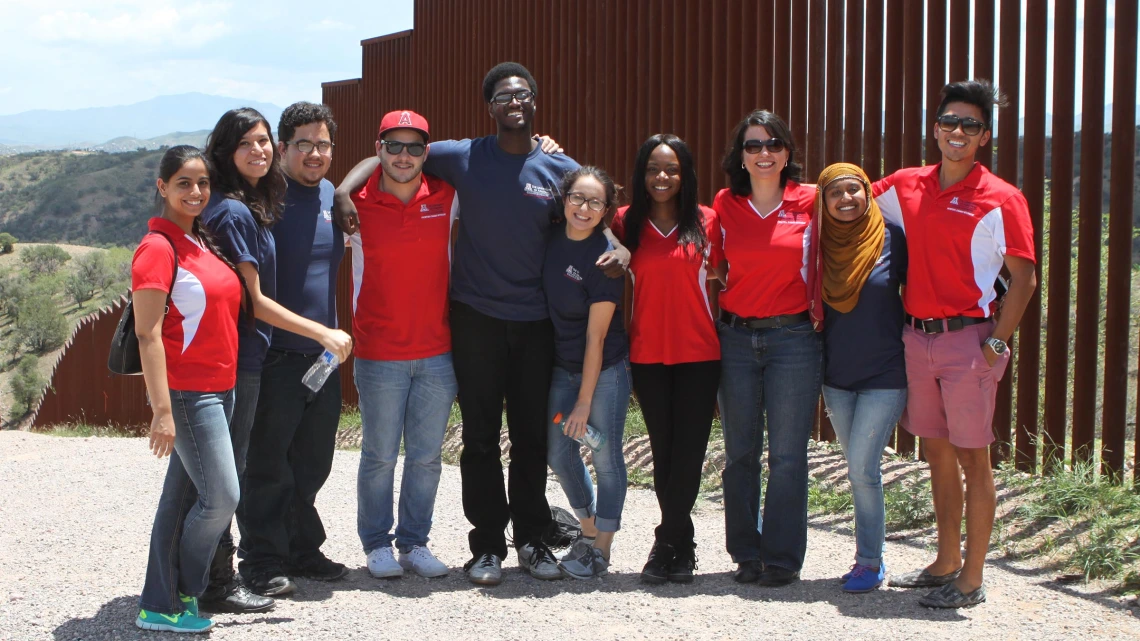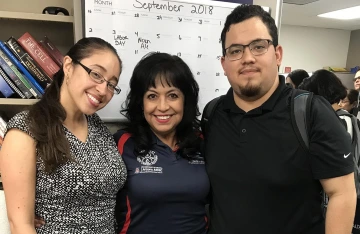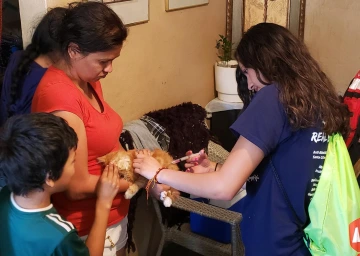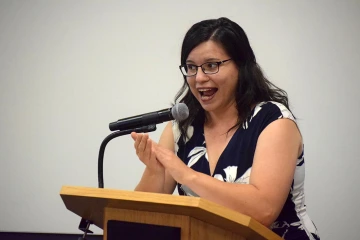From Med-Start to PCP Scholarship: One Student’s Journey
The Health Sciences Office of Equity, Diversity and Inclusion has built a health care career pipeline for students from underrepresented communities.

FRONTERA interns learn firsthand about the challenges affecting the U.S.-Mexico border region. Here, the 2014 cohort is pictured on a fieldtrip to the border wall. Ray Larez, MPH, is third from the left, and Alejandra Zapien Hidalgo, MD, MPH, is third from the right.
Ray Larez, MPH, grew up in the rural border town of Douglas, Arizona. He witnessed firsthand the difficulties his family members had accessing health care and developing trust with providers, and saw many of his neighbors travel across the border for medical care.
“Rural Arizona is a unique place with a unique set of challenges,” Larez said. “My family and I experienced many problems accessing care. Those are really valuable experiences that I’ve carried with me.”
Now a third-year medical student at the University of Arizona College of Medicine – Tucson, Larez has been on the path toward medicine for a long time, supported by the Health Sciences Office of Equity, Diversity and Inclusion (OEDI), whose mission is to build a pipeline from underrepresented communities to the health professions. Multiple programs attract talented students, exposing them to educational and career possibilities and inspiring them to reach their dreams.
Feeding the pipeline: Med-Start
For more than five decades, a competitive summer program called Med-Start has brought high school juniors from underrepresented communities into the health sciences. Students tour clinical and research facilities, work with mentors, visit rural and underserved regions, meet health professionals and gain hands-on experience performing basic medical skills.

Alma Aguirre-Cruz, center, poses with Med-Start alumni Erica Aguirre, MPH (left), and Ray Larez, MPH (right). Many alumni stay connected to Med-Start to offer guidance to the students coming after them.
“Med-Start is the beginning of our pipeline,” said Alma Aguirre-Cruz, Med-Start program coordinator. “We encourage students’ skills and their passion. They grow, mature and gain confidence. They learn college is not just a dream, it’s a reality.”
Students complete Med-Start with five college credits and a better understanding of how to choose colleges, find scholarships and financial aid, and navigate the application process.
“We guide them, advise them and give them the tools they need for higher education,” Aguirre-Cruz said. “Once they’re in college, we introduce them to different programs, get them prepared, get them connected with mentors.”
Opportunities for undergrads
Med-Start was the first step in Larez’s journey toward medical school. Later, as a University of Arizona undergraduate majoring in nutritional science, he remained connected to OEDI, first enrolling in FACES Conversantes, which places bilingual students in free clinics.

FRONTERA students participate in “service learning” projects. In 2019, they went door to door in Nogales, Sonora, offering rabies vaccinations to dogs and cats.
“We train students as lay interpreters,” said Alejandra Zapien Hidalgo, MD, MPH, director of the Bilingual Medical Spanish and Distinction Track at the College of Medicine – Tucson. “Most of them already work as interpreters for their family members. They know Spanish, but they need to learn medical terminology. Most of the physicians only speak English, so having an interpreter there makes a huge difference.”
Larez was also drawn to OEDI’s FRONTERA summer internship program, which brings students face to face with the health disparities that affect the border region.
“FRONTERA focused on things that were close to my personal experiences,” Larez said. “I was given opportunities to help the community in a way that I wouldn’t have as a resident. Being from a border town also provided a perspective to my colleagues, which was both enriching for myself and for them.”
Dr. Zapien says FRONTERA’s overarching purpose is to get students ready for medical school or other graduate programs, putting students into a clinical setting or the community, and letting them dive into a research project that culminates with a poster presentation.
“I’ll always remember feeling reassured, that this is what I want to do and I’m in the right place.”Ray Larez, MPH, College of Medicine – Tucson Class of 2022
Under the guidance of his mentor, Howard Eng, DrPH, MS, RPh, now retired as director of the Southwest Border Rural Health Research Center, Larez investigated physician participation in Medicaid in the border region, where physician shortages are made worse when providers don’t accept Medicaid.
“The border region is kind of its own country, where people go back and forth. It’s a binational experience,” Larez said. “People can go across the line to get antibiotics if the provider on the U.S. side has a three-month wait. If people can’t get a dentist on this side, they go across to the other side. I knew about these issues from my experience, but I didn’t know the nitty-gritty, academic side of it.”
Dr. Zapien says the students’ hard work combines with support from mentors to give them a sense of self-efficacy that sets them up for subsequent success.
“You see them grow throughout the program. They mature personally and feel more confident,” Dr. Zapien said. “We have great mentors who guide them throughout the process.”
“I’ll always remember that mentorship and feeling reassured, that this is what I want to do and I’m in the right place,” Larez added. “He helped me explore my interest in my own life experience and put it into practice.”
On to a health career track
Larez says his experience with OEDI paved the way toward the Mel and Enid Zuckerman College of Public Health, from which he received a master’s degree in 2018, and to the College of Medicine – Tucson, where he was one of the inaugural recipients of a Primary Care Physician Scholarship. Dr. Zapien emphasizes that her office simply provides resources, but students deserve full credit for their achievements.

Alejandra Zapien Hidalgo, MD, MPH, describes herself as a “cheerleader” for students working toward health professions.
Aguirre-Cruz and Dr. Zapien say watching students flourish is one of the most rewarding aspects of their jobs.
“Ray Larez was my first Med-Starter back in the day. I’ve seen how he has grown,” said Aguirre-Cruz, who has been with Med-Start for 14 years. “Other students are already doctors, pharmacists, nurses. They’re getting married and having kids. You got to know them when they were teenagers, and now they’re adults practicing their professions. I really consider myself to be lucky.”
The path laid out for Larez by OEDI could very well bring him full circle, right back to Douglas or a place like it. As a PCP Scholarship recipient, he has committed to use his medical degree to practice primary care in an underserved Arizona community, providing the care his family and neighbors had so much trouble accessing when he grew up.
“It’s a personal journey for me. I imagine myself being a community-centered physician who utilizes my public health and clinical training to serve the community,” Larez said. “I can provide health care to those with similar backgrounds as me and to those who have the challenges that my family and community still experience. I hope to be a community-minded healer.”

